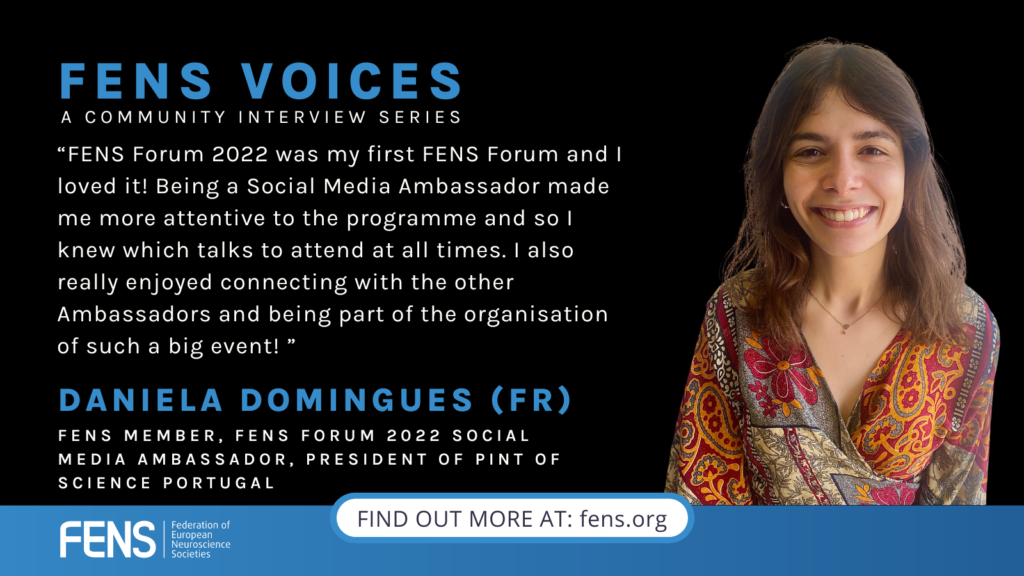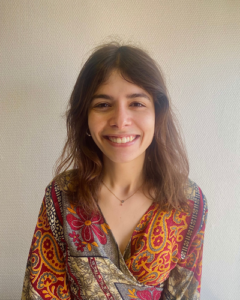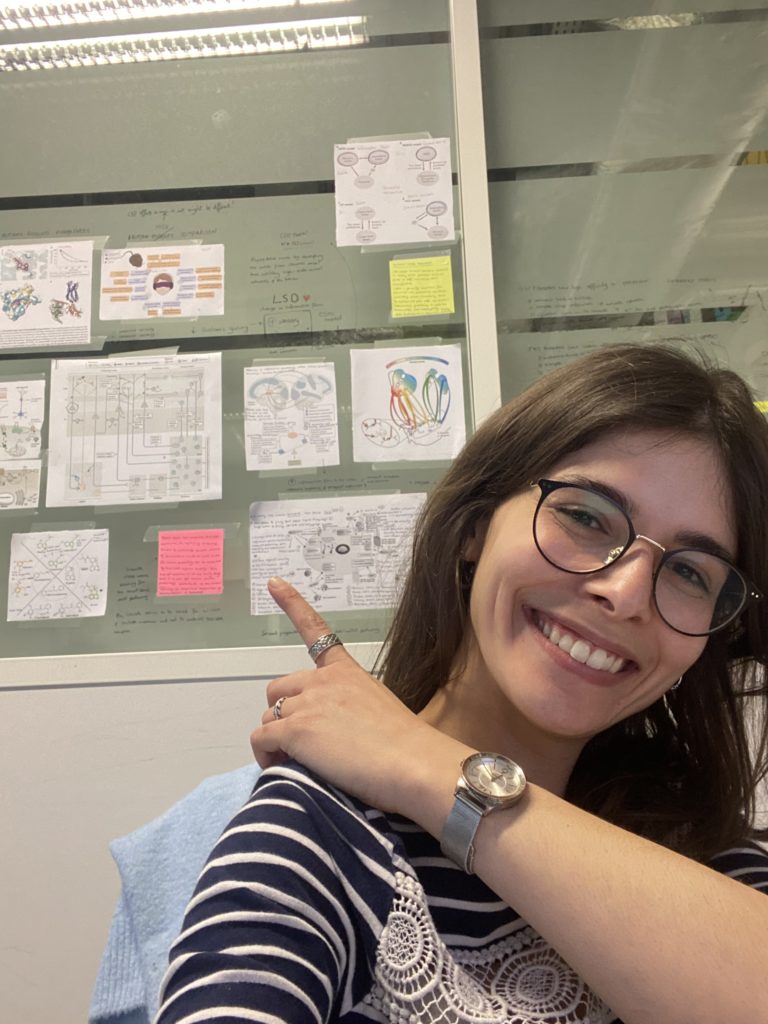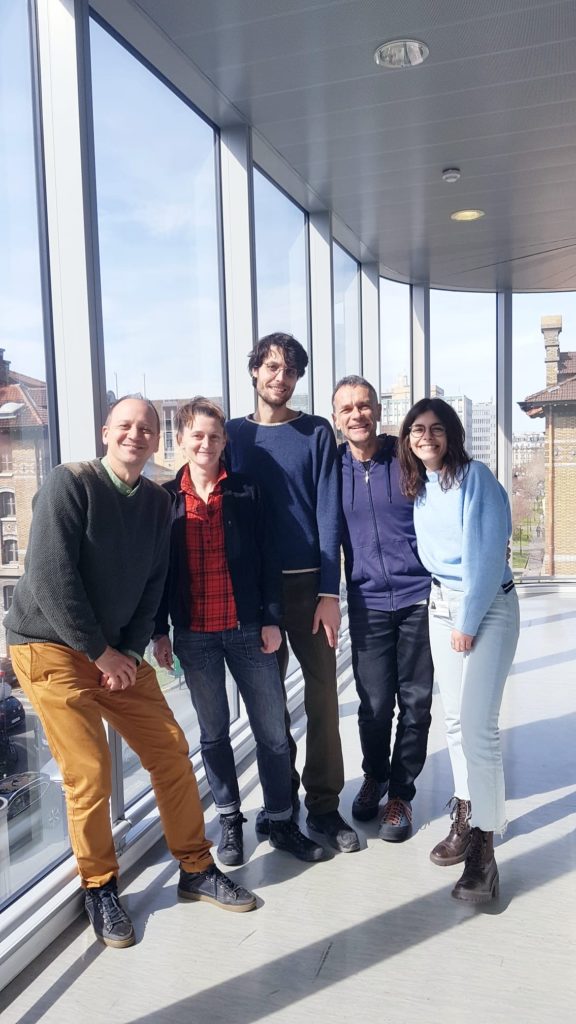
FENS Voices | Daniela Domingues: Science around a pint
07 April 2023
FENS News, Neuroscience News
FENS reached out to FENS Forum 2022 Social Media Ambassador Daniela Domingues, who is currently the President of Pint of Science Portugal, a Social Ambassador for Science Rehashed and a strong advocate for open science and diversity in STEM. Daniela is a PhD student in the lab of Eric Burguière at the Paris Brain Institute in France, where she is investigating the neural circuits modulated by LSD in the context of flexibility using a mouse model of OCD. In the past, she worked at King’s College London, Karolinska Institutet in Stockholm and Champalimaud Foundation in Lisbon. Her scientific interests are always evolving, but one constant is her passion for translational cognitive systems neuroscience. Read the full interview below.
At what age did you get interested in science and why did you decide to follow bioengineering through your university studies?
DD: I was always a kid with multiple interests. I remember replying to the question “What do you want to be when you grow up?” with “A journalist, a writer, an actress, a scientist and a lawyer, all at the same time”. So, I know that from an early age I was curious about science, which was only one of my many passions. I actually decided to do “science” in high school since there were more University admission exams for it than all the other professions I was considering. In my mind, the best strategy was to not limit my possibilities. Throughout the years, I realised that I really enjoyed biology, but also maths. Therefore, there was really only one perfect degree for me: bioengineering!

Who is the Michael Jordan of neuroscience in your eyes? What makes this scientist special?
DD: This is a tough question. Neuroscience is a huge domain and there are scientists I admire in each subfield which makes this answer quite complicated. Nonetheless, I can give some examples. When I was more into the memory field, I was reading everything coming out from the Tonegawa lab. Nowadays, I am more curious about what is being published by the Olson lab, the lab where I did my Master’s thesis. From the decision-making world, I follow thoroughly the work of both Uchida but also from the Witten Lab and, of course, the Paton lab (the lab where I fell in love with systems neuroscience). In the computational world, I love to learn with David Silver and Adam Kepecs. Finally, in the psychedelic world I really admire the research published by Roth and González-Maeso Labs (molecular), the Gobbi and Olson labs (in rodents) and the Vollenweider and Nutt labs (in humans).
What part of bioengineering did you like most? Could you please mention the highlights of your bachelor studies?
DD: What I liked the most about my bioengineering degree was its broad profile. I had classes of “anatomy” and “regenerative medicine”, but also “transgenic plants” and “fluid mechanics”. I think the general goal of the degree was to give us the tools and the fundamental knowledge of many domains to then allow us to pursue, more in depth, our area of interest.
I would say this was a major high point of my bachelor studies. Another one would be the city – Porto! I know that I might be biassed, but Porto is definitely one of the best places to study in Portugal and even in the entire world. Last but not least, during my degree, I was incentivised to apply for internships abroad to get a more international background in my field. I took all the opportunities I could, and I learned a lot from each one of them. So, in a nutshell, my recipe for a great bachelor time definitely includes a broad interesting domain, a lively university city and international opportunities.
When and how did you develop an interest in behavioural neuroscience?
DD: I developed my interest in behavioural neuroscience while doing my Master’s thesis at the Karolinska Institutet, in Stockholm. While studying, I discovered memory processes in mice, in particular while they were doing an adaptation of the Morris Water Maze task. I realised I really loved the process of thinking about a research question and ways of answering it. Usually, the best strategies always included behavioural tasks. I enjoy going to the sun with my coffee and thinking about how to translate a human task into an animal one, how to avoid confounding factors and calculating how I am going to analyse my data. It is like thinking of an experiment from A to Z in my mind and having fun and enjoying the process of that thought.
What made you later passionate about systems neuroscience and how was your experience at the Champalimaud Foundation?
DD: After my Master’s thesis, I decided to apply for a technical position at the Champalimaud Foundation since I was unsure about what I wanted to investigate during my PhD. In time, I understood that behaviour was very important, but not enough to answer my scientific questions if not paired with a systems neuroscience approach. I grew my interest in decision-making processes, but still with the vision of applying my work to the clinical setting. As such, my project was a collaboration with the pharmaceutical company Roche as I was investigating the effects of new compounds for Parkinson’s disease. Overall, the Champalimaud Foundation is a great place to do science within a collaborative environment, cutting edge technologies and open-minded scientists. On top of that, it is located in Portugal, so you are lucky to enjoy other benefits: good weather, good food and even better people (again, I am zero biassed)!
 You recently started a PhD at the Paris Brain Institute, where you are working with mice and psychedelics. Can you tell us how your research is connected to cognitive flexibility?
You recently started a PhD at the Paris Brain Institute, where you are working with mice and psychedelics. Can you tell us how your research is connected to cognitive flexibility?
DD: During my PhD, I aim to contribute to our understanding on how psychedelics modulate neuronal activity and ultimately our decision-making processes. I want to characterise the long-term effects of LSD at the systems and behavioural levels by recording mice’s brain activity while they perform a task under the effect of LSD. During the last decade, this field has started to reemerge with a major focus on clinical trials. Due to the positive outcomes of these trials, researchers have become more interested in exploring the core mechanisms behind it. From all the theories proposed, the one I want to follow during my thesis is the one that defends that psychedelics might enhance cognitive flexibility – the ability to switch between different mental processes in order to adapt to changes in the environment. To achieve this, I will investigate if mice under the influence of LSD increase their ability to flexibly switch between learned action patterns. Moreover, the goal is also to identify which brain regions are modulated by LSD in the long term.
You are the founder and coordinator of Pint of Science Portugal, an initiative that aims to communicate recent scientific developments to the public by bringing scientists to pubs, cafés and other public places to share their research and findings. What is the genesis story of Pint of Science Portugal?
DD: I heard about Pint of Science when I was doing my first internship abroad, in the United Kingdom. I was going out of King’s College London when I saw this poster about discussing science over a beer and I thought “why not?” and now, looking back, what a good idea did it turn out to be! That afternoon I ended up in a random pub, in a city I barely knew, having lots of fun! This was my first Pint of Science session. I knew I had to bring the same concept to Portugal. After all, we are a country where the best discussions happen around a beer. So, I emailed the organisation and voilà! Now, in 2023, we will have the 6th edition of Pint of Science Portugal in 10 cities and we plan to grow even more in the following years.
Do you think it is important for scientists to talk about their findings in their home countries and mother tongue language?
DD: I want to host Pint of Science events in Portugal, in Portuguese, because I believe scientists have the duty to communicate about their work to the general public. In my point of view, an educated population is a population that makes more informed decisions and that cares and trusts experts in their field. I want Portuguese people to trust and care about science and that is only possible if they can discuss with us, researchers, about what we do and why we do it. The Pint of Science concept is exactly this: it brings scientists to bars to present their work, in their mother tongue, in an informal context, so that the discussion is open to everyone. On top of that, let’s not forget that most research is subsidised by public funds, so I really consider science communication part of our job as researchers.

During the COVID-19 pandemic, you also made a start-up, alongside another researcher. What is your start-up all about?
DD: During the COVID-19 pandemic, Romain Ligneul (who was also a researcher at the Champalimaud Foundation, now a PI at Lyon Neuroscience Research Center) and I decided to apply for the innovation contest “Building Tomorrow Together” with a prototype that we developed to track early symptoms of Parkinson’s Disease. To be honest, we applied for the competition without big expectations because we knew we were competing with already formed start-ups and laboratories with many years of experience in this domain. Nevertheless, we did our best and at the end we won the third place of the competition and with that the recognition of our work (and prize money as well)! Motivated by this award, we decided to start our own start-up and that is how “Robust Circuit” was born.
Currently, our start-up is part of a major European consortium called “CONTROL-PD” and our main focus is the development of online cognitive tests. We aim to develop neuroscience hardware devices in the future so check our website, www.robustcircuit.pt to stay updated! We are also organising a free workshop at the FENS Regional Meeting 2023 in Albufeira, Algarve, as a satellite event of the conference. Our workshop will offer a unique opportunity for participants to learn about the fundamentals of interactive web applications and about the essential concepts and skills required to develop online behavioural experiments and clinical tools. It is going to be lots of fun and for us it was also a way of giving back to the community!
You were a FENS Forum 2022 Social Media Ambassador. Was this your first FENS Forum and how was this experience overall? How did it feel to be a Social Media Ambassador and what attracts you to science communication?
DD: FENS Forum 2022 was my first FENS Forum and I loved it! Being a Social Media Ambassador made me more attentive to the programme and so I knew which talks to attend at every time. I also really enjoyed connecting with the other Ambassadors and being part of the organisation of such a big event! On top of that, FENS Forum 2022 happened in Paris and so it was lovely to have all my neuroscience friends visit my new home. In general, when I know about a scientific event or a paper or a finding that I find particularly interesting I want to share it with the world! Doing it makes me happy because I feel I am contributing to making important information reach more people. This is what attracts me to science communication.
In the end, as we all know, sharing is caring!
About the Federation of European Neuroscience Societies (FENS)
Founded in 1998, the Federation of European Neuroscience Societies is the main organisation for neuroscience in Europe. It currently represents 44 national and single-discipline neuroscience societies across 33 European countries and more than 22,000 member scientists. Discover FENS and subscribe to our biweekly News Alert, with information on our latest calls and activities.
About the FENS Forum
The FENS Forum of neuroscience is the largest international neuroscience meeting in Europe. It covers all fields of neuroscience research and comprises a range of symposia, technical workshops, plenary and special lectures and poster sessions as well as a number of social events. Coordinated by FENS in partnership with the Austrian Neuroscience Association and the Hungarian Neuroscience Society, the FENS Forum 2024 will take place on 25-29 June 2024 in Vienna, Austria. The FENS Forum 2024 will bring together experts in all fields of neuroscience to take us to the forefront of our current understanding of modern brain science.
About the FENS Regional Meeting
The FENS Regional Meeting (FRM) is dedicated to supporting member societies in promoting excellence in research, with a European regional focus. FRMs occur on odd years and aim to strengthen neuroscience in all European countries, promote scientific exchange within and across European regions and secure representation and access to the FRM programme for underrepresented scientists and topics. Organised by the Portuguese Society for Neuroscience, the FRM 2023 will take place in person on 3-5 May 2023 in Algarve, Portugal.
About the Pint of Science Festival
The Pint of Science Festival aims to deliver interesting and relevant talks on the latest science research in an accessible format to the public – mainly across bars, pubs, cafes and other public spaces. It provides a platform which allows people to discuss research with the people who carry it out and no prior knowledge of the subject is required. Organised as a network of thousands of volunteers who are passionate about bringing discoveries to people, The Pint of Science was established by a community of postgraduate and postdoctoral researchers in 2012. The next Pint of Science Festival will take place from 22-24 May 2023.